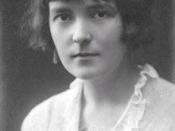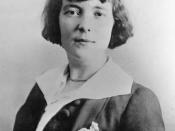Katherine Mansfield, who revolutionised the English short stories of the 20th century, explores the opposition of human nature and conventions through many of her prose. In 'Bliss', this idea is mainly navigated through the experiences of the main character Bertha. The conventions of the Britain intelligentsia confined and controlled Bertha in all aspects of her life, restricting her from behaving the way she would like to during her bliss and bringing up her baby. The conventions also influenced her in her marriage and her choice of friends, and forced her to exhort a perfect, modern life. The impacts of the pressures and expectations of the society can also be seen in some of the minor characters, and the suppression of human nature by society is evident in 'Bliss"
At the start of the story, an obvious example of convention versus nature appears as Bertha experiences 'absolute bliss'.
This 'bliss' makes her want to 'run instead of walk...take dancing steps on and off the pavement, to bowl a hoop... to stand still and laugh at nothing." But the society, which was described as 'idiotic', does not allow a women of the age thirty do all of that without labelling her as "drunk and disorderly". Bertha felt as if her body was "[kept] shut up like a rare, rare fiddle". Her coat was also a symbol for the confinement she felt- "she could not bear the tight clasp of it another moment." The pressure that she feels from society's conventions is apparent. When she tries to suppress her over -excited mood, she scolded herself as being 'hysterical' and 'absurd', giving examples of what others would think of her as . She does not express her bliss, despite the 'fire of bliss...blazing' furiously in her , pushing her...



Well done
Well written analysis. I am going to be writing a short story for school this term and I may look in to this K. Mansefield for some ideas. Thanks!
0 out of 0 people found this comment useful.